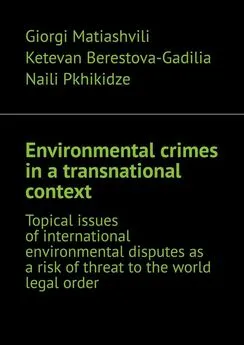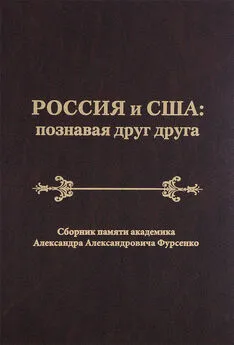Giorgi Matiashvili - Environmental crimes in a transnational context. Topical issues of international environmental disputes as a risk of threat to the world legal order
- Название:Environmental crimes in a transnational context. Topical issues of international environmental disputes as a risk of threat to the world legal order
- Автор:
- Жанр:
- Издательство:неизвестно
- Год:неизвестен
- ISBN:9785005620408
- Рейтинг:
- Избранное:Добавить в избранное
-
Отзывы:
-
Ваша оценка:
Giorgi Matiashvili - Environmental crimes in a transnational context. Topical issues of international environmental disputes as a risk of threat to the world legal order краткое содержание
Environmental crimes in a transnational context. Topical issues of international environmental disputes as a risk of threat to the world legal order - читать онлайн бесплатно ознакомительный отрывок
Интервал:
Закладка:
Environmental crimes in a transnational context
Topical issues of international environmental disputes as a risk of threat to the world legal order
Giorgi Matiashvili
Ketevan Berestova-Gadilia
Naili Pkhikidze
© Giorgi Matiashvili, 2022
© Ketevan Berestova-Gadilia, 2022
© Naili Pkhikidze, 2022
ISBN 978-5-0056-2040-8
Created with Ridero smart publishing system
GIORGI MATIASHVILI

MBA BACHELOR EN DROIT INTERNATIONAL. INTERNATIONAL LAWYER.Member of an,,International Bar Association,, IBA, a,,World Academy of Science Engineering and Technology,, WASET a,,European society of International Law,, ESILSEDI. Author of а book and scientific articles in international journals.
Contact information: mativar199@gmail.com
KETEVAN BERESTOVA-GADILIA

DOCTORAL CANDIDATE OF Ph. D IN LAW.Real member, of TAO-KLARJETI SCIENTIFIC ACADEMY. With 20 years of experience working in private and public structures. Author of a book and scientific articles in top international journals.Contact information:qetevanberestova@gmail.com
NAILI PKHIKIDZE

Ph.D.in Law, Real member, ACADEMICIAN of,, FAZISI ACADEMY,, With 27 years of experience working in private and public structures. Author of books and scientific articles in international journals.
Contact information: nai0202@mail.ru
Translation made: ZHANA TCHOLARIA. Master of Education (M. Ed). E-mail:getranslator1@gmail.com
*Abstract
,,As we progress into the twenty-first century, anyone who considers themselves a realist will have to make the environment a top priority. ” -Leonardo DiCaprio
Extreme heat wave, severe forest fires, floods and other types of natural disasters around the world confirmed undoubtedly, that this is a climatic disruption, which turned out into a large-scale extreme situation for our entire planet.
,, God finds the quilty’”, as Homer said, and we entered in to the period of consequences. Governments simply observed, how the disasters spread out, striving forward to new pipe system and annual trillions in subsidies of fossil fuel. Correspondingly, against the background of commercial interests and striving for material wealth, they forgot and put under question tomorrow’s existence of their own habitat.
At the end of the 60s of the twentieth century, the United Nations Organization drew the attention of the world community to the rampant pollution of the environment and the exhaustibility of natural resources as one of the global problems of our time. Overgrowth of technological progress has changed the rules of the game of survival.
The emergence of international environmental law as a separate legal regime was a very important event in the late 1920s.
Environmental law represents the distinctive sub-discipline of public international law. The international community had been alarmed by environmental damage and technological disasters, which had tendencies to become more and more destructive. However, international environmental law has achieved considerable progressive growth and continues to adapt to the corresponding changes in the echo of the results of technological progress, but the state of the world’s environment continues to deteriorate.
The world community acknowledged, that the actual and potential consequences of the degradation of ambient environment are becoming such a serious, that the humankind and order of nature are under threat of extinction and therefore, it is necessary to pay more attention to prevention of the damage of ambient environment. In this regard, the use of international criminal justice to protect the ambient environment has become urgent. The consequences of some ecological disasters are perceived far beyond national borders, this is why, more stringent measures are needed to stop the repetition of events. The goal of our century is to turn back the tide of this process by making sure, that the governments are fully performing their obligations and gradually undertaking more stringent responsibilities in order to preserve the ambient environment.
This thesis, which is analyzing the spectrum of judicial bodies that deal with solving of environmental disputes, proposes a re-evaluation of their topicality in modern conditions. We think this thesis is especially topical in an epoch, when the issues of ambient environment are increasingly becoming the subject of consideration of international jurisdictions, and will represent the interest to those interested in this area of vital importance.
This thesis studies the international environmental crisis of the modern world and we tried to substantiate the necessity for international cooperation between states in the environmental field.
In our opinion, the development of international environmental cooperation should follow the road leading to the creation of a single international legal environmental law, one international environmental organization, and also one international environmental court.
International environmental law represents a very specific branch of international law, therefore, the judges should be experts in the field not only of ecology, but also specialists in the aerobatics of legal science – International law.
Both the state and international governmental and non-governmental organizations, as well as natural persons should have the right to access to international environmental justice without restriction.
Within the framework of international law, the fulfillment of the obligations undertaken by all states serves as a guarantor of the stability of the ecosystem of the world and the peaceful coexistence of states with different socio-political systems. In the modern world, primary importance is given to the issues of compliance by all subjects of international law of international obligations, related to compliance with the terms of the 1975 Helsinki Agreement. The obligations include: protection of ambient environment, prohibition and non-proliferation of weapons of mass destruction, prohibition of the elaboration, production, transportation, proliferation and use of chemical and biological weapons, etc.
According to Article 2 of the Resolution of UN General Assembly “On the responsibility of states for internationally wrongful acts,” to the elements of an internationally wrongful acts of a state refer to violations of an international legal obligation of that state. And according to the article 12 of the abovementioned resolution “There is a breach of an international obligation by a state when an act of that state is not in conformity with what is required of it by that obligation, regardless of its origin or character. Part II of the abovementioned resolution discloses the content of the international responsibility of states. It considers general principles (chapter I) and forms of indemnification (chapter II) by a State for its internationally wrongful act. Violation of the undertaken obligations within the international and interstate treaties, firstly, creates a threat to the existing system for the implementation of international agreements, and, secondly, generates the legal responsibility for failure to fulfill the obligations undertaken under the treaty.
The principle of fulfillment in good faith of obligations these days represents the main core of the existence of the structure of international law as a source of legal force of this law and interstate relations, since without fulfilling obligations incompliance with the international law, a civilized relationship between subjects of international law to achieve the goals provided for by the UN Charter is impossible. The importance of this principle is indicated in the preamble of the UN Charter, which indicates “The respect for obligations arising from treaties and other sources of international law,” and in part 2 of article 2 of the UN Charter, which states that “All Members of the United Nations Organization shall fulfill in good faith the obligations undertaken by them in accordance with the present charter, in order to ensure to all of them collect of rights and advantages arising from belonging to the membership of the Organization. Hereinafter, the principle of fulfillment in good faith of obligations according to international law received reinforcement in individual international norms, in particular: in the statutes of International Court of Justice of United Nations organization (Article 38); Declarations on the principles of international law. These are generalized norms that reflect the characteristic features and the main content of international law, having supreme legal force.
The underlying principles of international law are fixed in the UN Charter; Declaration on the principles of international law concerning friendly relations and cooperation between states in accordance with the 1970 UN Charter; In the final act CSCE 1975y.
Organization for Security and Co-operation in Europe (OSCE), the world’s largest regional security organization is engaged in security issues. It unites 57 countries located in North America, Europe and Central Asia.
The former name is Conference for Security and Cooperation (CSCE) in Europe. It was convened as a standing international forum of representatives of all European states (except Albania and Andorra), as well as the United States and Canada, to develop measures to reduce military confrontation and strengthen security in Europe. The meeting was held in three stages.
July 3 – 7, 1973 – Helsinki – Conference of Ministers of Foreign Affairs;
September 18, 1973, July 21, 1975 – Geneva – Introduction of proposals, amendments and agreement on the text of the Final Act;
July 30 – August 1, 1975 in Helsinki-the capital of Finland, the leaders of 35 original member nations signed the final act of the conference on Security and Cooperation in Europe (Helsinki Accords).
– Vienna Convention on the Law of Treaties 1969 (preamble, articles 26, 31, 46).
Vienna Convention on the Law of Treaties emphasizes the important role of international treaties, as “a source of international law and as a means of developing peaceful cooperation between nations, regardless of their differences in their state and social system”, in all fields of cooperation.
Not only abovementioned, but also other principles of international law form the foundation of the law of environmental safety and international security. This provision was specially emphasized by the UN General Assembly. Effective collective measures can only be carried out on the basis of respect for the principles of sovereign equality, non-interference in internal affairs and self-determination.
Respect for human rights and democracy are of paramount significance to prevent a threat to the world. Everyone has the right to life, and the state and the international community as a whole must ensure an international setup, where in this right can be fully realized (Article 3 and 28 of Universal Declaration of Human Rights). From this, the human right to peace is emerging, which is associated with the right to peace of the people and the state. In the Declaration on “the Right of Peoples to Peace”, the ensuring of which is the fundamental obligation of states. And this also obliges them to apply the principles of the peaceful settlement of disputes, both intrastate and international, disputes of a different nature, including environmental disputes.
Читать дальшеИнтервал:
Закладка:










